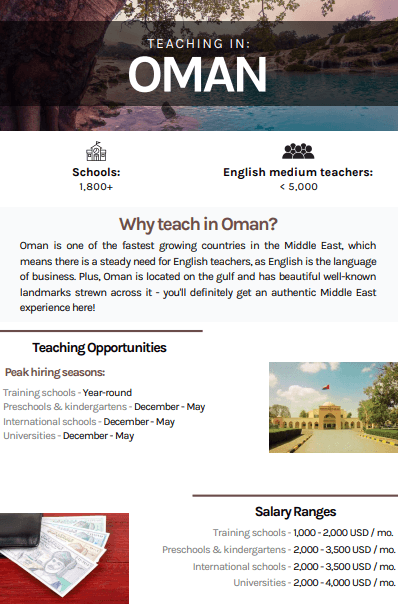Teach English in Oman
Oman is home to some of the best teaching opportunities in the Middle East!
Why teach abroad in Oman?
Get ready for an amazing experience while teaching abroad in Oman. If you’re interested in living near 2,700 km of sandy beaches on the Gulf, Oman is the perfect teaching destination for you.
There are a few different teaching options in Oman for foreigners. Some examples include local schools or international schools that cater to a completely international student base.
English is taught as a second language beginning from the fourth grade in public schools, and students sometimes start learning English earlier in private schools. Therefore, opportunities to teach English in Oman are quite prevalent. Older students in Oman are also interested in learning English in order to better understand other cultures, to travel abroad, and to pursue higher education and secure their desired jobs. English is also used throughout Oman’s service industry, and it plays a major role in Oman’s national development and modernization.
Something that also tends to cross the mind of a teacher looking to teach abroad is – how are the students? Are they friendly? Respectful? Open to foreign teachers?
The answer is yes to all of those questions – Omani students are known for being well-behaved, hard-working students that are eager to learn. Respect is a quality that most Omani parents really want their children to have, and Omani children (and adults for that matter) are known for being very friendly and polite.
Overview
Requirements to teach in Oman:
- Hold a Bachelor’s degree
- 2+ years of teaching experience for K-12
- Native English speaker
Average salary in Oman:
1,000 – 4,000 USD / month
This varies based on experience, hours worked, and the type of school that you work in.
Cost of living in Oman:
$1400 – $3000 USD / month
This varies by lifestyle and city that you choose to live in.
Growth of the education sector
Formal education in Oman is thought to have started in the 1930s, and since then, both the public and private education sectors have grown tremendously. There are now over 1,800 schools in Oman with over 100,000 teachers staffing them.
Geography has always been an issue for the education sector in Oman, as population density is spread out across the mountainous country. Due to this, Muscat and Salalah are two very popular places for foreign teachers to go, as they are highly populated areas with many teaching opportunities available.
A lot of work has been put in to modernize the educational structure in Oman, as well as to update the infrastructure all across the country to make education more accessible and standardized across different schools. Oman also heavily relies on the influx of foreign teachers to help improve the education sector.
Curriculums used in Oman
The most popular curriculums used in Oman are IB, U.S./AP, local, and the National Curriculum for England. If you have experience or want to gain experience teaching one of these curriculums and you want to teach in the Middle East, teaching in Oman might be for you!

Teaching IB in Oman
As of 2020, there are 6 schools in Oman that use the IB curriculum. This equates to a healthy number of IB teaching positions, many of which are available to foreign teachers. Learn more about teaching IB in Oman, and check out the history and an overview of teaching IB abroad in our blog.

Teaching U.S./AP in Oman
There are many schools in Oman that offer AP courses to students. To be able to offer AP courses, a school must submit its curriculum to the AP program to ensure that the proper standards are being met. Teachers must prepare their students for the AP exams that usually take place within the first two weeks of May.

Teaching the local curriculum in Oman
Public or government-operated schools in Oman enroll around 90% of all students, with the remaining 10% attending private or international schools. Public schools teach the standard subjects through the Arabic medium and also include Islamic education. Basic education includes two cycles, grades 1-4 (co-ed) and grades 5-10 (single-sex). After this, students may continue onto post-basic school (grades 11-12) or vocational school.

Teaching the National Curriculum for England in Oman
The National Curriculum for England is the set of standards used to through England & Wales to ensure that all children are learning the same things as they move through schooling. The curriculum is set out in 4 required key stages for students ages 5 – 16. With an optional key stage 5 for ages 17 & 18 (years/grades 12 & 13). Students attending international schools almost always include key stage 5, also known as college, in the British sense of the word.
The curriculum defines the fundamental aspects of learning including the subjects to be taught, the knowledge, skills, and development with each subject. The level of ability students are expected to achieve in the subject, and lastly how students will be assessed. With that framework, schools are free to plan and organize lessons as they see fit.
Accreditation for the National Curriculum for England comes directly from the UK Department of Education and includes a scheme for overseas schools, called BSO’s (British Schools Overseas) to verify they meet the standards of UK schools.
Why consider teaching in Oman?
Oman is constantly in need of foreign English teachers, as English is the language of business and is widely used throughout the world. Omani parents typically want their children to learn English from native speakers, so there are always open ESL teaching positions for all grade levels in Muscat, Salalah, Seeb, Sohar, and other cities around Oman. If you’ve decided that teaching in Oman is right for you, check out the available jobs in the cities you’re interested in and get started teaching abroad today!
If you enjoy outdoor activities, you’ll love Muscat! The beautiful beaches, valleys, and mountains that allow for swimming, hiking, camping, etc.
If you’re concerned about clothing restrictions, especially if you’re woman, then not to worry! You don’t need to wear an abaya or cover your hair in Oman. Just remember to still dress respectfully (cover shoulders and knees). You can pretty much dress however you want if you’re going out clubbing or to bars (dresses, skirts, etc.).
Compared to what you’re likely used to, teaching in Muscat will be quite different. You’ll create many things from scratch, which is difficult sometimes, but it leads to a lot of learning and growth for you as a teacher. There can be a lack of structure that is hard to deal with in some schools, but other schools have excellent resources and processes in place already.
Muscat is a great place to teach abroad, and teachers cherish the time that they spend there!
Salalah is the capital city of southern Oman’s Dhofar province. It’s known for its banana plantations, Arabian Sea beaches, and waters teeming with sea life. There are plenty of teaching opportunities around Salalah!
Seeb is a coastal fishing city, located several kilometers northwest of Muscat, in northeastern Oman. In Seeb, you’ll find numerous street markets where you purchase out-of-this-world food. Also, be sure to stop by Sultan Qaboos Grand Mosque while in Seeb!
Sohar is a port city on Oman’s northern coast. Facing the Gulf of Oman, the centuries-old Sohar Fort houses a museum exploring the city’s cultural and trading past. Go explore the nearby terrain in Sohar or check out a camel race while you’re in Sohar!
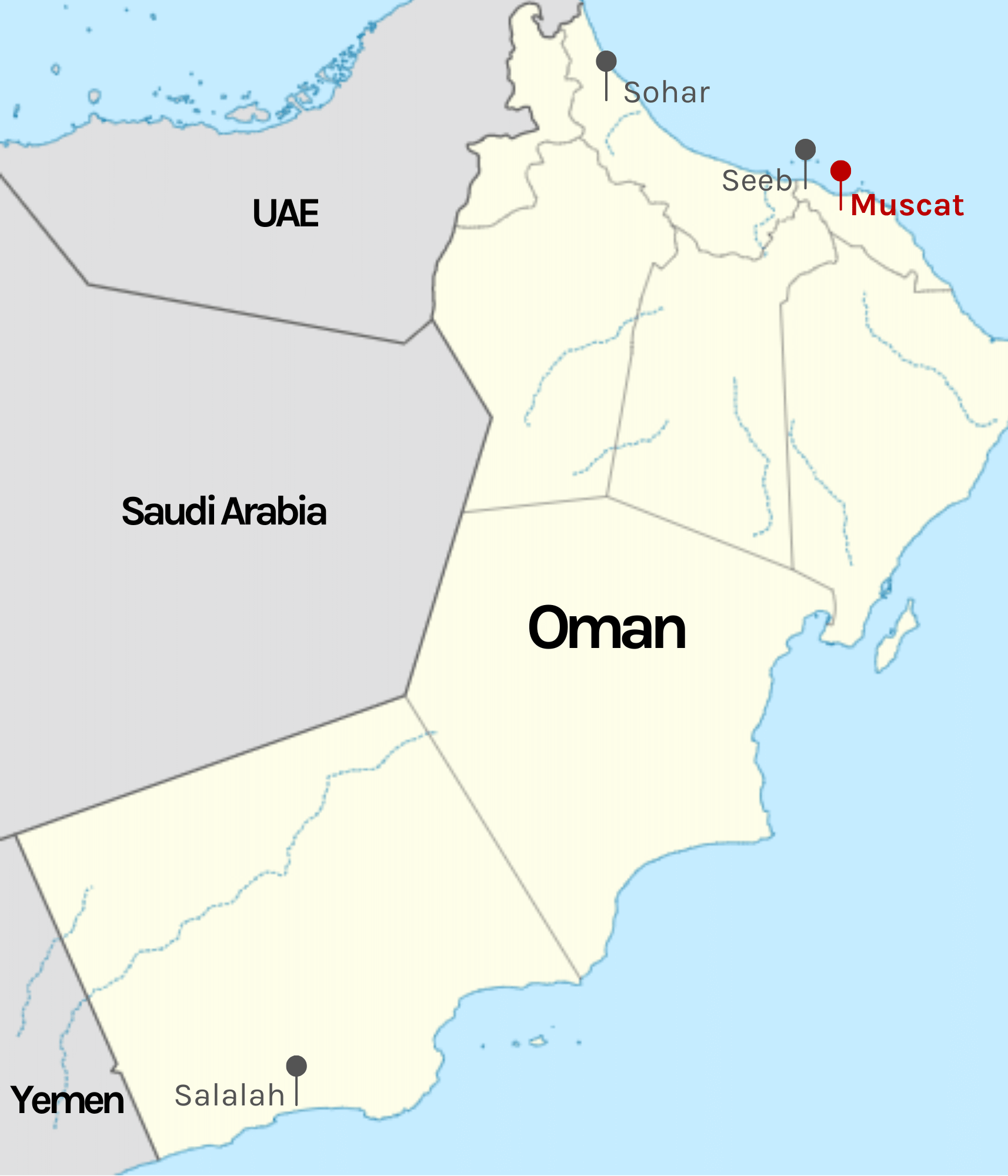
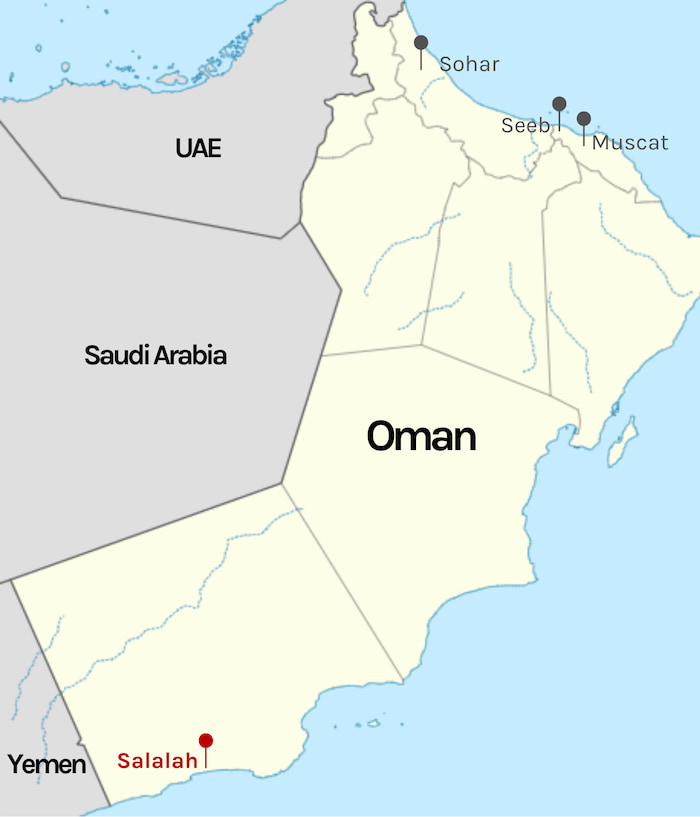
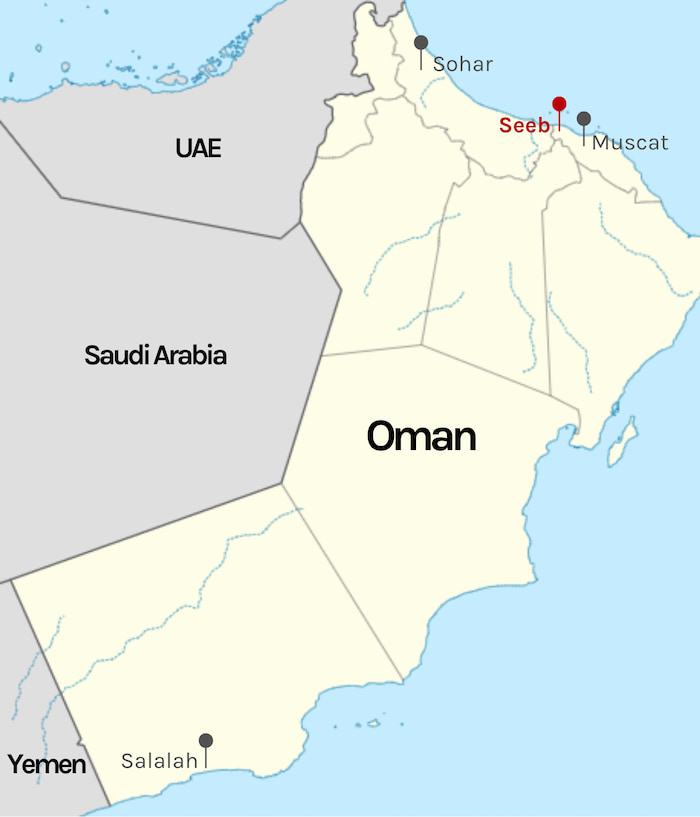
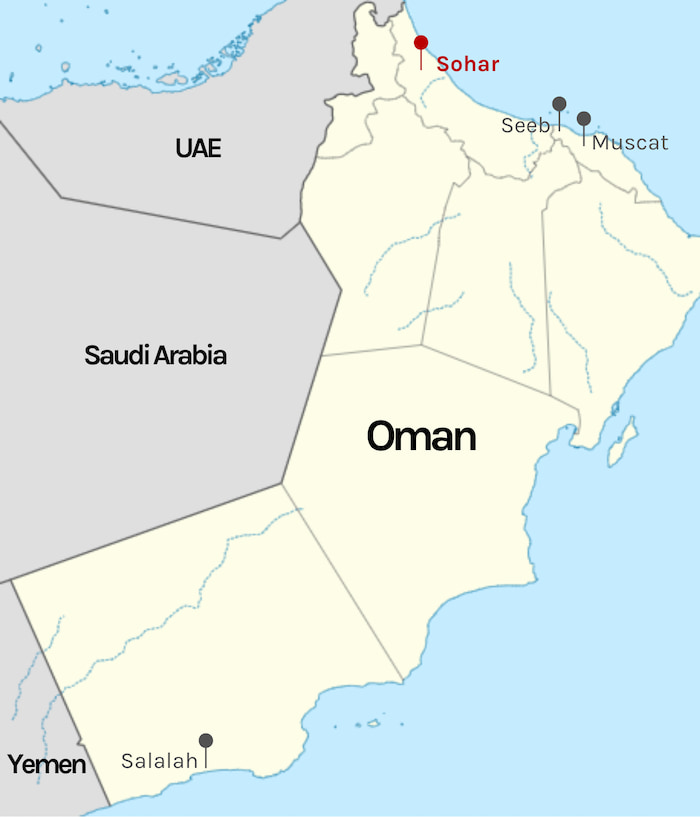
Types of schools in Oman
The most common types of schools in Oman that foreign teachers work in are training centers, preschools and kindergartens, international schools, and universities. Each has a slightly different schedule in terms of teaching hours and time off, as well as different salary ranges. You’ll want to choose a type of school to work in based off of your financial and time off expectations.
Training centers in Oman
There are some teaching options in Oman for foreign teachers at training centers. These schools are attended by kids or adults in the evenings and weekends specifically for English language instruction.
Positions at training centers are often easiest to secure as there is a high demand for these classes, and they hire year round. Each center has its own specialized curriculum, as well as teaching and training materials which means planning and preparation time are minimized.
Preschools and kindergartens in Oman
The name says it all, the children in these institutions are 18 months to 6 years old. Teaching English in a kindergarten or preschool is a very common job in Oman.
Teachers can expect a friendly working environment and a teaching assistant in the classroom with them. There will be plenty of fun teaching materials available and little time is needed for preparation. Classes typically have 8-20 young learners and are between 20-40 minutes long.
International schools in Oman
These schools are where professional expats and wealthy locals send their children. Tuition for the students is high and enrollment is very competitive. This means that teacher remuneration is fantastic (especially if you have children) but these jobs will often require a teaching license and graduate degree.
Classes are held on the traditional two-semester schedule and almost all classes are taught in English. These schools often require a 2-year commitment from the teachers. Most international schools will follow either the International Baccalaureate (IB) or the foreign (A-level/AP etc.) curriculum, so teachers with experience and familiarity with these curriculums are preferred.
Universities in Oman
There is a lot of variety within these jobs. Positions at smaller universities usually hire foreign teachers to teach required English classes, some universities are less selective when it comes to hiring foreign teachers. Even if the university originally hired you to teach a specific subject, entry-level teachers will rarely be teaching anything other than oral English. Jobs at universities are more competitive than English training centers. The university curriculum is flexible and the foreign teacher is responsible for creating teaching materials.
Schedule and start dates
K-12
Fall starts in August/September
Spring starts in January
University
Fall starts in August/September
Spring starts in January
Training Schools
Rolling start dates year-round
Start anytime!
K-12 schools work on a similar schedule as western countries with the fall semester starting in late August or early September and the spring semester starting around January. For fall positions, we suggest applying 4-5 months in advance and 2-3 months in advance for spring. In addition, Oman has options in training schools, which hire new teachers every month! No matter your schedule, we’ll be able to help find the best teaching opportunities available.
Salary and benefits while teaching English in Oman
There are many different types of schools to choose to work at in Oman, so you’ll want to do a little research on each one to figure out which type will best suit your lifestyle, salary, and time-off needs. There are often trade-offs that you will need to consider with each type of school. For example, if you want a higher salary, you’ll need to work more hours, so maybe you should consider an international school. However, if you want more time off, you may want to work at a university where you’ll have less working hours.
Here’s how experience & qualifications can affect your earning potential:
Bachelor’s Degree:
A degree is one of the minimum qualifications to work in Oman. In many cases, the major of your degree will need to be related to the subject you teach.
TEFL/TESOL Certification or 1-year teaching experience:
Teaching Nomad does maintain a minimum requirement of TEFL certification or 1+ year(s) teaching experience. However, to teach with our schools in Oman, a proper government-issued teaching license is usually required. Therefore, the reason to consider TEFL certification is not for the visa, but rather to ensure you have the skills needed to connect with ESL learners.
Teaching license and/or degree in education:
A teaching license is often required to teach in Oman. If you are licensed to teach in your own country, the salaries can be quite lucrative in Oman. Salaries typically start at $2,500 USD and can go up to 3,500 USD a month or more. In addition to salary, you can expect housing and other benefits.
Post-graduate degree:
The better educated you are, the more jobs there are available. An advanced degree can move you higher on the pay scale and make you eligible for head of department/leadership roles that come with additional salary allowances. An advanced degree will certainly make your application stand out as well.
Location:
The pay and living expenses are generally much higher in bigger Omani cities like Muscat and Salalah. Plus, there are more teaching job options here.
Hours:
As you can imagine, the number of hours you work will affect your salary. Training schools generally require you to teach 20 hours, and typically pay between 1,000-2,000 USD. At kindergartens and preschools, you can expect a similar number of teaching hours. Though the teaching hours at international schools aren’t much different, they require more class preparation time and are stricter on office hours.
Benefits:
In Oman it is common to receive furnished housing as part of your teaching contracts. As well as medical insurance, annual flight benefit, tuition discounts, and end of contract bonuses!
Document Legalization
In order to get a visa to teach in Oman, you must get some of your teaching documents legalized by the Omani Embassy. This can be a difficult process on your own, so we now offer a service that gets it done for you, hassle-free!
What our teachers are saying
I’d highly recommend Teaching nomad because it is a reputable, international agency that has teaching opportunities all over the world. Their website is easy to use, the consultants are attentive and help you throughout the process. I’d choose them all over again.
I was helped by Moira, and the support provided to me was second to none. I’m super grateful for the support. Finding a job during this difficult period would have been a challenge on my own, however, the assistance from Teaching Nomad made the process much easier. They also offered continuous support once I started working. They have been absolutely fantastic.
TN helped me from the very start, which for me was trying to decide which TEFL certification to go with. From there my consultant, Moira, helped me with the documents I needed, gave me resume tips, sent off my profile to various schools even before my certification was complete, and gave me interview tips when the schools wanted to meet me. Thanks to the help Moira and Teaching Nomad provided, I have just signed a contract with a higher than normal salary for a first-time teacher. Now they are helping me out with authenticating my documents and my application for a visa!
Blogs about teaching in Oman
Learn all about teaching, traveling, and living abroad!
No Results Found
The page you requested could not be found. Try refining your search, or use the navigation above to locate the post.
Ready to get started or still have questions?
Register now to speak with a personal placement consultant!


